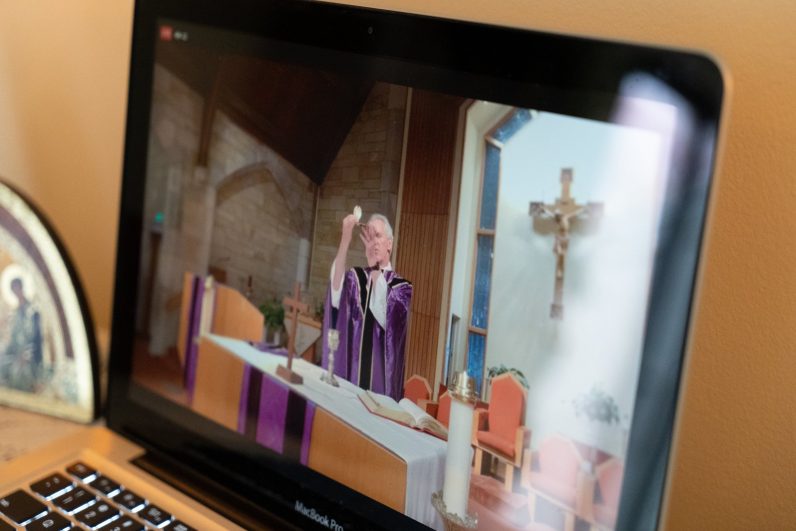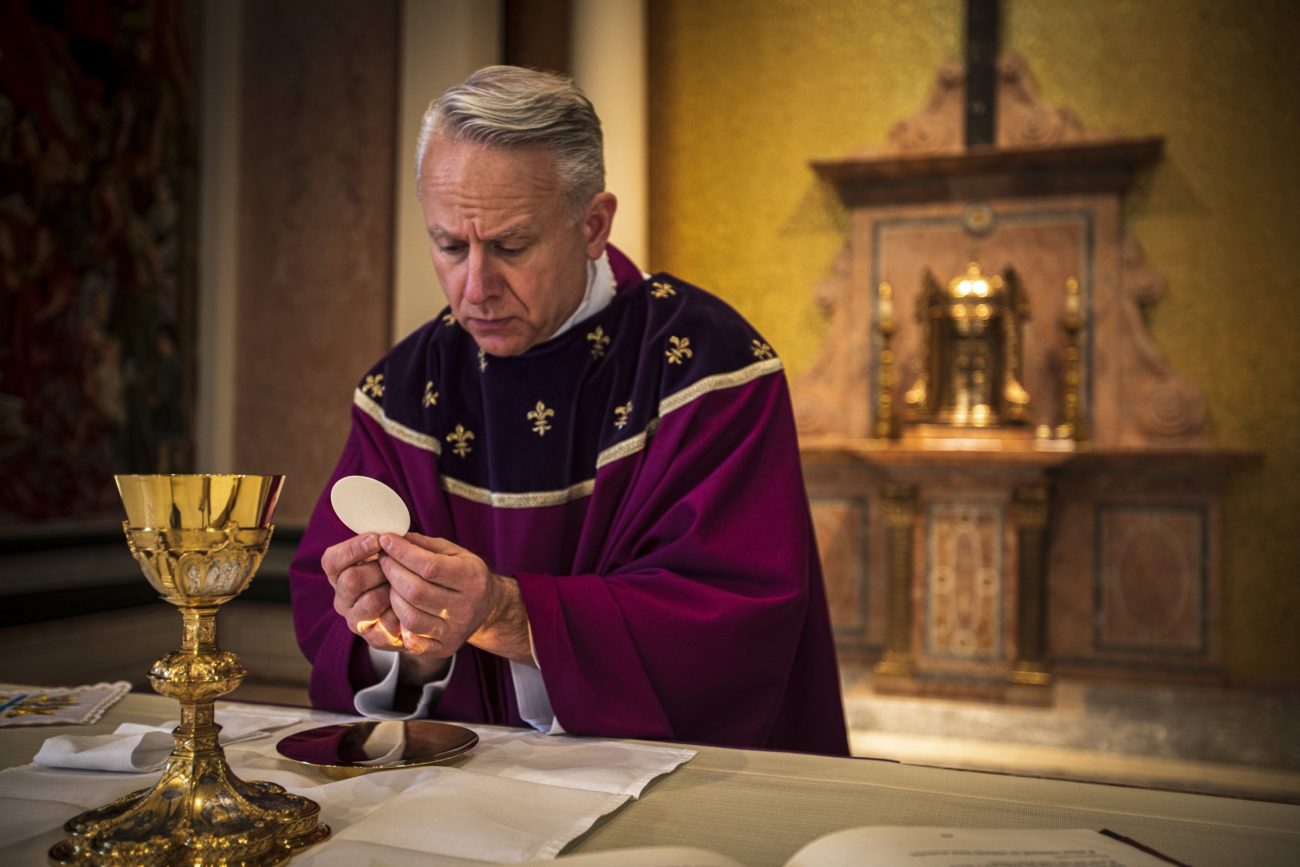LEWES, Del. (CNS) — When Father Brian S. Lewis celebrates Mass these days, it’s being filmed and uploaded to YouTube so that those who are self-isolating because of the increased spread of the coronavirus can worship along with him and his masked congregation at St. Jude the Apostle Parish in Lewes, Delaware.
When he consumes the Eucharist during Mass, he looks into the camera and receives it — not just for himself — but for all of the viewers who are unable to receive the body of Christ at the church.
It’s his way of connecting with his YouTube Mass worshippers who are observing “spiritual Communion” at a time when it isn’t possible for them to receive the sacrament.
[hotblock]
“The people who are here at Mass — though they are wearing face masks and are participating in Mass in the safest way possible — are physically able to receive the Eucharist, the real presence of Christ, in a way that our virtual worshippers are not,” Father Lewis told Catholic News Service in a recent interview.
“We’re still limited as to how many people can attend Mass in the church safely,” he said. “So, not everyone is always able to come in here for Mass and there are other parishioners who for health reasons continue to worship by watching Mass on their television screens or computer monitors. That’s when ‘spiritual Communion’ is their best option.”
The global disruption to Mass attendance caused by COVID-19 — which for a time included the complete shutdown of churches in many areas — has renewed interest in the idea of “spiritual Communion,” a custom dating back centuries that has been encouraged by popes and saints throughout the church’s history.
“Spiritual Communion” is the act of desiring union with Jesus in the holy sacrament and is used to prepare oneself for Mass by the faithful who can’t actually receive the Eucharist, a practice Pope Francis urged Catholics to follow in the early days of the COVID-19 pandemic.
Cindi Flahive-Sobel, a cantor and parishioner at St. Jude Parish, said she missed receiving the Eucharist in the months she worshipped virtually before Mass resumed in church this summer. But she recognized the need for “spiritual Communion” during those months and believed the sacrifice of not receiving was more important than the sacrifice of the people not being able to come together to receive.
[tower]
“‘Spiritual Communion’ is real,” Flahive-Sobel told CNS. “If we can believe in the spirit being within the Eucharist, we can believe in the spirit of Communion coming to us through our hearts when we go to a (virtual) Mass, no matter how shaky and distracted” it appears on the screen.
During the time she was attending virtual Mass and practicing “spiritual Communion,” Flahive-Sobel also wasn’t seeing her children or grandchildren, going to the grocery store or participating in life as she had known it up until that point.
“That was just one more thing that we put in the bucket of ‘this is a very strange time,'” she said.
A very strange time is how Father Mark R. Searles, resident priest at St. Thomas More Parish in Allentown, Pennsylvania, has described the pandemic. But he acknowledged that offering “spiritual Communion” to parishioners who watch his livestreamed Mass has offered him comfort.
“It was a powerful time to still lift up the Eucharist as a priest on their behalf,” Father Searles told CNS. “It was a powerful way to focus, as heartbreaking as it was not to see the people in front of me and praying with me.”
Though the church requires Catholics to attend Mass every Sunday and other holy days of obligation, it only obligates them to receive holy Communion at least once a year.
The pope and bishops have issued dispensations for the Sunday Mass obligation during the pandemic — and other in circumstances when Mass attendance is difficult or unsafe, but encourage the faithful to seek alternatives, such as livestreamed Mass.
However, popes in the past 100 years have encouraged Catholics to receive the Eucharist whenever they attend Mass in order to draw them into the communion of the Lord’s body.
“Spiritual Communion” is a necessary practice in times such as the coronavirus pandemic, but it’s not a substitute for receiving the Eucharist, said Oblate Father Kevin Nadolski, vice president for mission and a professor of education at DeSales University in Center Valley, Pennsylvania.
“We believe in the real presence of Jesus, not the virtual presence of Jesus,” Father Nadolski told CNS. “That real presence of Jesus comes to us through the power of the Holy Spirit among the people of God.”
There is a danger in diminishing the understanding that the Eucharist is the real presence of Jesus, he said, as is evident in a 2019 Pew Research Center survey that found nearly 70% of Catholics believe the bread and wine used for Communion are “symbols of the body and blood of Jesus Christ,” while about 30% believe that the bread and wine “actually become” Christ’s body and blood.
“‘Spiritual Communion’ is a wonderful practice and one that we should continue when we need to, during a pandemic, when people are housebound and can’t receive the Eucharist,” Father Lewis said. “Jesus comes, not simply in spirit, he comes in body and spirit. So he gives us his body and his blood, his soul and his divinity in the Eucharist and that is irreplaceable.”
St. Alphonsus Liguori offered this prayer for those seeking “spiritual Communion.”
“My Jesus, I believe you are really here in the Blessed Sacrament. I love you more than anything in the world, and I hunger to receive you. But since I cannot receive Communion at this moment, feed my soul at least spiritually. I unite myself to you now as I do when I actually receive you.”

Mass is livestreamed on Facebook by Father Tom Kovatch, pastor of St. Charles Borromeo Catholic Church in Bloomington, Ind., March 28, 2020. As coronavirus cases spike again, priests are encouraging the faithful who are watching the Mass livestreamed and have no access to the Eucharist to practice “spiritual Communion.” (CNS photo/Katie Rutter)
PREVIOUS: Catholic Charities of Baltimore ends international adoption program
NEXT: OCP now retails personal missals to parishioners amid pandemic




Share this story